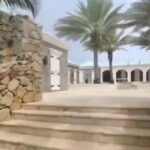The story of Indiana Jones unexpectedly sprang to life during a recent expedition in Petra, Jordan.
The expedition took place at the monument known as the Khaznah, which translates from Arabic to “the Treasury.”
Though the name may sound obscure, film lovers in the West are sure to be quite familiar with the location.
In the 1989 Steven Spielberg classic “Indiana Jones and the Last Crusade,” it was the ancient burial site of the Holy Grail — the cup used by Jesus at the Last Supper.
According to CNN, back in 2003, two tombs were found near the monument, suggesting to archaeologists that other “secret underground chambers” had yet to be found.
For over two decades, those theories went unproven.
Then, in August, a team of archaeologists led by Pearce Paul Creasman, an archaeologist and executive director of the American Center of Research, finally found what researchers had long been searching for: A long-forgotten ancient tomb.
Thankfully, though, the team didn’t run into any Indiana Jones-esque booby traps.
Do you believe that the Holy Grail still exists today?
Yes: 0% (0 Votes)
No: 0% (0 Votes)
Instead, they found various skeletons and “grave goods made from bronze, iron and ceramic.”
Perhaps most shocking of all, one of the skeletons was holding a chalice that looked like the Holy Grail from the 1989 feature.
When Creasman’s team ventured down into the tomb, they brought a Discovery Channel crew with them, including Josh Gates, host of a series called “Expedition Unknown.”
“The Treasury in Petra is world-famous as the resting place for the Holy Grail in Indiana Jones and the Last Crusade. And up until ten seconds ago, I was sure that was just a movie.”
Watch #ExpeditionUnknown with @joshuagates tomorrow at 9p on @discovery. pic.twitter.com/xGdGwzxGV0
— Discovery (@Discovery) October 15, 2024
Gates himself was shocked that Creasman’s crew had found their very own “Holy Grail.”
“It really was this awesome moment of history imitating art,” Gates said, according to CNN.
Creasman was no less intrigued by the findings.
“We were hopeful to find anything that might tell us more about the ancient people and place — human remains can be a really valuable tool in that regard,” Creasman said, according to CNN.
“The burials in this tomb are articulated, so the bones haven’t been rummaged around and moved, so that’s exceedingly rare.”
There are still many mysteries yet to be solved regarding the skeletons, however.
Researchers will continue to analyze them, however, with various forms of testing on the extracted DNA, CNN reported.
“They must be hugely important people, because where they’re buried is such prime real estate; it really is the main entrance to the city,” Gates said, according to CNN.
“I think learning who they are is really going to help unlock part of the story of the Treasury.”
Advertise with The Western Journal and reach millions of highly engaged readers, while supporting our work. Advertise Today.






